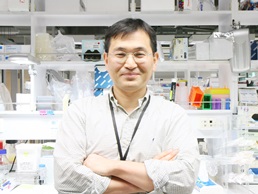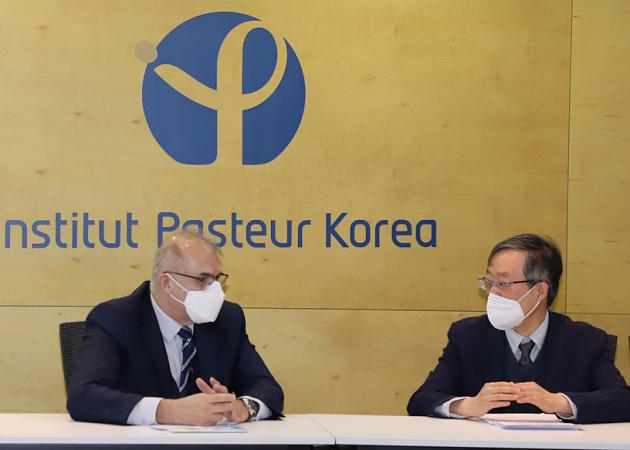Institut Pasteur Korea, Daewoong prepare to test niclosamide in human trials
“Niclosamide showed an antiviral effect, regulating the autophagy function of virus-infected cells of the host. We picked it as a drug candidate to treat the new coronavirus because we confirmed such effect in laboratory conditions and identified its mechanism of virus suppression.”
Kim Seung-taek, head of Institut Pasteur Korea (IPK)’s Zoonotic Virus Lab Team, said so on niclosamide, an ingredient of animal tapeworm drug, in an interview with Korea Biomedical Review on Thursday.
He is in charge of developing a treatment of Covid-19 in IPK’s lab.

IPK has been focusing on drug repositioning to fight the coronavirus pandemic. The research institute has reviewed more than 1,500 medicines authorized by the U.S. Food and Drug Administration and narrowed them down to 24 candidates that showed the potential to work on the Covid-19 virus.
The institute chose drug repositioning over finding a new substance to shorten the development period drastically.
Among the 24 drugs, IPK picked niclosamide, the ingredient of parasiticide, for clinical trials.
“Niclosamide has been effective in Covid-19 cell experiments, and tests in other countries, including Australia, have reported similar results,” Kim said. “The ingredient also showed potency against MERS (Middle East Respiratory Syndrome) and SARS (Severe Acute Respiratory Syndrome) viruses. We also found a mechanism of a wide range of antiviral effects, to some extent.”
According to IPK’s research team, niclosamide’s effect was 40 times stronger than that of remdesivir, an investigational drug for Covid-19 by Gilead Sciences, and 26 times more potent than chloroquine, an antimalaria drug.
In terms of the efficacy of drugs, there was a drug that showed stronger efficacy than niclosamide, he went on to say. Still, infectious disease specialists noted the drug’s high toxicity made it impossible to use it for patients, Kim added.
Even though the FDA already authorized all the drug candidates, some medicines cannot be used for patients with particular diseases, he noted.
Despite positive potentials, niclosamide has many obstacles to overcome to be reborn as a Covid-19.
The biggest hurdle is that a human body cannot easily absorb an oral tapeworm drug. As the blood concentration cannot be appropriately maintained, it is difficult to expect the effect shown in a cell test in a human body. Many companies around the world are working hard to develop a proper form of the drug to maintain the appropriate blood concentration levels.
During a discussion with the Ministry of Food and Drug Safety, IPK got to talk with Daewoong Therapeutics, which was developing niclosamide as a lung disease treatment.
IPK and Daewoong are now preparing to conduct a phase-2 trial on the drug, converting the drug form from an oral one to a new one.
To obtain approval for a trial, the two also need an efficacy test for primates. Researchers will pay attention to whether the effect shown in a cell test will be reproduced in animal experiments. There have been no reports of primate efficacy testing of niclosamide in Covid-19 around the world.

Korea is at the forefront in terms of using the parasiticide to develop a Covid-19 treatment.
IPK and Daewoong hope to start the phase-2 study in July after animal tests in May. If they prove the efficacy, they could receive conditional approval and roll out the drug in the market quickly. However, the development might prolong if the import of animals for a test becomes difficult due to the Covid-19 pandemic. Also, the decreasing number of confirmed cases in Korea might slow the process.
“We have to bring beagles from China for tests, but there are not many Chinese businesses in normal operation due to the Covid-19 situation. It takes some time because of flight restrictions,” Kim said.
As the number of Covid-19 patients is dropping in Korea and 80 percent of them have mild symptoms, it will be challenging to recruit patients and predict the timing of the end of the trial, he added.
Kim cautioned against any hype or an exaggeration of the parasiticide’s potential.
“We just confirmed niclosamide’s antiviral effect and mechanism in a cell test. We have to run several more tests before beginning a clinical trial. In other countries, researchers are trying various methods to use it as a Covid-19 treatment,” he said. “As a canine tapeworm drug was in controversy over its anticancer effect last year, people should not exaggerate the anthelmintic effect.”
IPK is also testing asthma treatment ciclesonide (brand name: Alvesco) to fight Covid-19. The institute could start the investigator-initiated trial early because the agent already had the permit.
Professor Kim Woo-ju of the Infectious Disease Department of Korea University Guro Hospital is the principal investigator. The trial will compare the monotherapy of ciclesonide with the combination of ciclesonide and hydroxychloroquine to evaluate the agent’s therapeutic effect against Covid-19.
On Thursday, French Ambassador Philippe Lefort visited IPK in Pangyo, Gyeonggi Province, to discuss the research of the Covid-19 treatment and ways to enhance cooperation between the two countries.
“While all the media focused on chloroquine or remdesivir, IPK found other potential drugs such as ciclesonide and niclosamide with a unique approach,” Lefort said.

